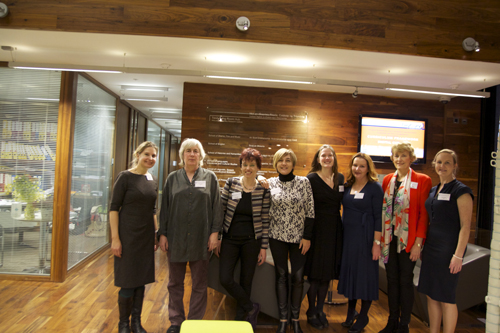Launch of New Group to Promote Language Learning
Posted on: 15 November 2013
The importance of language learning for employment, education and intercultural understanding was highlighted at the launch of a new group promoting language learning at Trinity College Dublin.
One Voice for Languages is a group of over 200 linguists, academics, teachers, parents, arts representatives and business leaders who have come together to highlight Ireland’s deficit in 21st-century language skills and the diminishing status of language learning in the Irish education system.
Responding to repeated calls from industry leaders, employment specialists and experienced linguists, the group is seeking to raise awareness of the critical importance of language learning not only in terms of increasing employment possibilities and meeting industry needs, but also its broader value in the spheres of education, the arts and in the context of supporting social cohesion and intercultural understanding.

Dr Christiane Schoenfeld, Senior Lecturer in German Studies, Mary Immaculate College, University of Limerick; Prof Sarah Smyth, School of Languages, Literatures and Cultural Studies, Trinity; Kristin Brogan, School of Business & Social Studies, Institute of Technology Tralee; Susanna Nocchi, School of Languages, Law, Society, Dublin Institute of Technology; Dr Ann Devitt, School of Education, Trinity; Tanya Flanagan, St Farnans Post-Primary School, Co. Kildare; Dr Déirdre Kirwan, Principal, Scoil Bride, Dublin 15 and Niamh Nestor, School Of Irish, Celtic, Folklore & Ling, UCD
The group was officially launched at an event hosted by Trinity’s School of Education and School of Languages, Literature and Cultural Studies in Trinity Long Room Hub. This is the first time that the support of language teaching and learning, including the teaching of Irish Sign Language, is being addressed by an umbrella group representing all levels of the education system, as well as business leaders and social entrepreneurs.
Key facts highlighted at the event included:
- Only 40% of Irish people can claim they can hold a conversation in any second language, the fourth lowest rate in Europe.[i]
- A 2010 IBEC Education and Skills Survey of 339 companies reported over 10% identified languages as an area in which they are likely to experience an ‘occupational skills gap’ in the coming two-year period.[ii]
- Ireland is the only country in Europe other than Scotland where a non-indigenous language is not compulsory at any stage of the mainstream educational curriculum.
- Since the dissolution of the MLPSI (Modern Languages for Primary Schools Initiative) in 2012, Ireland is the only country in the EU where non-indigenous languages have no place in the primary curriculum.
- Despite the recommendation of the Council of Europe Language Education Policy Profile (2008), Ireland still has no languages in education policy.
- A 2006 Eurobarometer survey of EU citizens showed that Ireland was the member state with the highest percentage (66%) of citizens admitting to ‘not knowing any other language than their mother tongue’.[iii]
- The RIA National Languages Strategy (2011) recommends that modern languages be treated as a priority subject at third level as a matter of urgency to prevent the erosion of language capacity in Ireland.[iv]
Speaking at the launch Dr Ann Devitt, Assistant Professor in Modern Languages at the School of Education in Trinity, commented: “The One Voice for Languages group seeks to highlight how important languages are for Ireland, not only in terms of skills for the economy but also in terms of societal and cultural benefits. Ireland has the potential to become a place of rich linguistic diversity: we have our Irish national language; we have languages of migrant populations and we have a long history of engagement with a wide range of European languages.”
“At present, this potential wealth is not being developed. Only 40% of us can claim that we can hold a conversation in any second language, the fourth lowest rate in Europe. The One Voice for Languages group aims to voice our country’s need to interact and communicate in languages other than just English and to give our young people the language skills they need to fully integrate and assume their role in the global marketplace.”
Dr Sarah Smyth, Associate Professor in Russian, Trinity, added: “The Ireland of today is indeed a rich tapestry of languages. The last census indicates that there are over 160 languages spoken in Ireland today. We hope to support the Irish Government in capitalising on the significant varied language and cultural backgrounds of our 21st-century population and to equip our young people with the language skills they need to function in a country and a world where understanding across cultures is key.”
Media Coverage:
Media Contact:
Fiona Tyrrell, Press Officer for the Faculty of Arts, Humanities and Social Sciences, Trinity College Dublin | E tyrrellf@tcd.ie |T: + 353 1 8964337
[i] European Commission Eurobarometer Report on Europeans and their languages,2012
[ii] McGann, K., IBEC Education and Skills Survey, 2010.
[iii] Europeans and their Languages, European Commission, 2006
[iv] RIA National Languages Strategy, 2011
